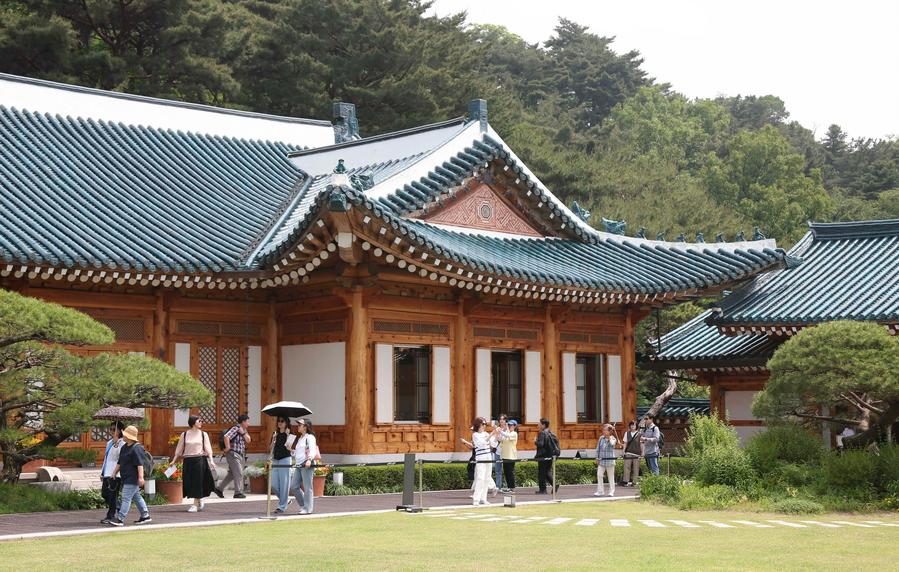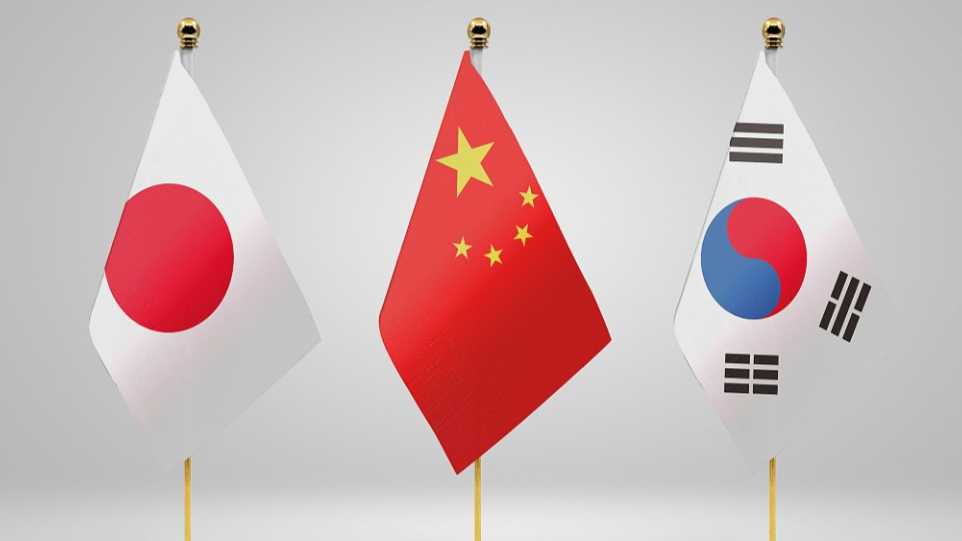
SEOUL - Leaders of China, Japan and the Republic of Korea (ROK) will meet in Seoul from Sunday to Monday for a trilateral summit, more than four years after it was last held in 2019.
The resumed gathering through the established framework among the three neighbors is significant, as it heralds the trio's willingness to redirect focus on dialogue and cooperation and navigate through ruffled waters of the regional landscape and beyond.
People of the three countries hope that the meeting will boost trilateral cooperation, deliver win-win results and help to promote regional prosperity and stability.
More necessary than ever
Chinese Premier Li Qiang, Japanese Prime Minister Fumio Kishida and ROK President Yoon Suk-yeol will attend the trilateral summit meeting, the trilateral business summit and other events.
It is hoped that the leaders of the three countries will discuss critical issues including rebuilding trust, expanding economic and trade cooperation as well as cultural exchanges, and strengthening current cooperation mechanisms.
Liu Qing, Vice-president of the China Institute of International Studies
It is prevailingly believed that cooperation and solidarity among countries are desperately needed to address major challenges facing this region and the world, including protectionist trends, armed conflicts, supply chain restructuring and climate change.
READ MORE: Li to meet with Japan, ROK leaders in Seoul
In an ever-evolving global and regional landscape featuring economic uncertainty and geopolitical volatility, the three-way cooperative network in Northeast Asia, which was stalled due to geopolitical interferences and the pandemic, is more necessary than ever.
Trilateral relations have been facing fluctuations for a while, but recent high-level interactions indicate that the trio is making an effort to fix them.
Liu Qing, vice-president of the China Institute of International Studies, said the resumption of the trilateral talks sends "a strong message" that the three countries are committed to resolving disputes through diplomatic means.
"It is hoped that the leaders of the three countries will discuss critical issues including rebuilding trust, expanding economic and trade cooperation as well as cultural exchanges, and strengthening current cooperation mechanisms," Liu said.
Though it is still early to predict concrete results, the convening of the meeting "will be an accomplishment in its own right," said the Japan Times.
ALSO READ: China, ROK foreign ministers meet
Lee Hee-sup, secretary-general of the Trilateral Cooperation Secretariat (TCS), told Xinhua that the upcoming meeting "will serve as an opportunity to revive various cooperation projects and revitalize trilateral cooperation".
"The three countries need to share a clear perception that win-win-win through cooperation, not confrontation and conflict, is the only way forward for national interests and the happiness of their peoples," Lee noted.
Wide-ranging cooperation
Twenty-five years after its inception, the trilateral meeting has grown from an economy-focused gathering aimed at countering the financial crisis into a full-fledged, multi-tier mechanism that promotes cooperation in a spectrum of areas.
Chinese foreign ministry spokesperson Wang Wenbin said that China stands ready to work with Japan and the ROK to implement the Trilateral Cooperation Vision for the Next Decade and other important common understandings
Analysts said that after a hiatus of more than four years, the forthcoming ninth edition of the meeting will focus on re-establishing and enhancing collaborative mechanisms.
Chinese foreign ministry spokesperson Wang Wenbin said that China stands ready to work with Japan and the ROK to implement the Trilateral Cooperation Vision for the Next Decade and other important common understandings.
Wang was talking about the document released at the eighth summit in China's Chengdu in December 2019, which mapped out the route for trilateral cooperation. The trio agreed to expand cooperation in environmental protection, climate change, health, aging population, scientific and technological innovation, sports, youth and other fields.
Strengthening people-to-people exchanges is expected to be a palpable focus for this year's summit.
READ MORE: China-Japan-ROK meeting to be held to bolster ties
Tourism, for instance, continues to be a main driver in this regard. According to Ctrip, an online travel agency in China, Japan ranked first among foreign countries in attracting Chinese tourists during the Golden Week holiday in May. Panda fever, meanwhile, has made panda-themed tours to China's Sichuan province a popular option for ROK citizens.

Noting that the three neighbors share many cultural similarities, Lee said that the TCS, launched in 2011 to promote peace, prosperity and shared culture among the three nations, is ready to foster closer ties among their people.
The institution plans to expand youth exchanges through projects such as the youth summit, the youth ambassador program, and the youth speech contest this year.
Scholars predicted that strengthening supply chain stability, expanding markets, and increasing investment will remain high on this year's agenda to boost economic integration and enhance regional economic resilience.
Hwang Jae-ho, director of the Seoul-based Institute for Global Strategy and Cooperation, said attention is also on whether the three parties will be able to speed up the negotiations over the China-Japan-ROK free trade agreement and enhance cooperation in supply chains.
Citing the semiconductor sector as an example, Liu said that despite pressures from the United States, China's industrial chain continues to benefit Japanese and ROK companies.
ALSO READ: Respect one-China principle, Japan urged
While competition between the three countries remains a constant, the potential for cooperation is increasingly critical, as each of the three brings unique strengths to the table, Liu said.
Pivotal role of Asia
The three countries have overcome economic, public health and other crises through mutual support, demonstrating the importance of trilateral cooperation as the frontrunner for the benefit of the region and the world.
As major economies in Asia, the trio accounted for 20 percent of the global population, 23.4 percent of the world's GDP, and 18.7 percent of world trade as of 2022, according to the latest data from the TCS.
The three countries, which have achieved economic growth through free trade and globalization, need to cooperate closely for the protection of free trade and the multilateral trade systems in a world where the free trade order is being threatened.
Lee Hee-sup, Secretary-general of the Trilateral Cooperation Secretariat
Highlighting Asia's burgeoning economic power, Liu said the collaboration within the Regional Comprehensive Economic Partnership (RCEP) not only fosters economic cohesion in Asia, but also enhances the region's role as a vital engine for global growth.
"As Asia strengthens its economic ties and continues on this trajectory, its influence on the world stage is expected to expand, cementing the 21st century as the era of Asian ascendancy," he said.
READ MORE: RCEP members encouraged to harmonize rules
Despite ups and downs in ties among the three countries due to outside interference and their historical factors, Hwang emphasized "the synergy that will be created if the three countries cooperate."
"Asia is re-emerging as a pivot of the world history," he said. "It is necessary to make pan-Asian discussions, in which Asians themselves can create visions and action plans for the future of Asia."
Lee noted the key role the three nations can play in safeguarding globalization and multilateralism.
"The three countries, which have achieved economic growth through free trade and globalization, need to cooperate closely for the protection of free trade and the multilateral trade systems in a world where the free trade order is being threatened," he said.
ALSO READ: RCEP to bring more vitality and certainty
Liu said that by committing to regular dialogue and collaboration, the trio can address common challenges and leverage their collective strengths for mutual benefit.
"The renewed focus on cooperation sets a hopeful tone for the future, where Asia can become a cornerstone of peace and development in the global arena," Liu said.


